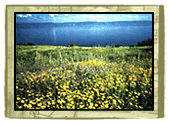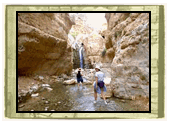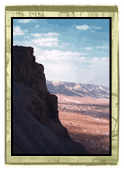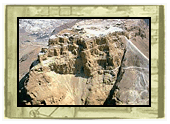 |
 |
 |
|
|||

An American Jew in Israel
We're driving up a small mountain that looks out over the Sea of Galilee, which is really the size of a lake. The higher we go, the more the landscape looks like upstate New York: pine trees, grassy, rocky hillsides. Beyond the Sea of Galilee are the Golan Heights, a series of rounded, low, green hills. 
The Golan is one of the most beautiful parts of Israel; it's also a region that Prime Minister Ehud Barak may eventually return to Syria, either in whole or in part, in order to make peace. Many Israelis, even left-wing ones, think it would be a mistake to give it up. A bumper sticker we see everywhere says: "No Israel Without The Golan." At the top of the mountain we're climbing is a beautiful hotel called Mizpe Hayamim that has a sauna, a swimming pool, and a great view; each of the rooms has its own mini-Jacuzzi. This is one of those moments when Adam and I are acutely aware that we are staying in places we could never afford on our own. Here we are in spa, for God's sake. The food is all organic and vegetarian, and they make their own cheese and jam and bread from ingredients and animals they raise themselves. I'm not sure if I can convey over the radio just how relaxing it is here -- roosters crowing as hens peacefully lay perfect, hormone-free eggs; goats nibbling hay, peacocks wandering freely, the Sea of Galilee below, a Jacuzzi in every room -- except to say that after only one night in this place, swaddled in comfort and urged at every turn to enjoy ourselves, Adam and I had a profound revelation about traveling as a couple, which is that you have the exact same fights that you do at home.
Etcetera, etcetera.
We're in the office of a kibbutz called Ein Gedi. Brian Dann is their PR person. He's a Texan who moved to Ein Gedi 24 years ago and pretty much never left. He's around six feet tall, reddish brown beard, white straw Stetson. Kibbutzes are collectively owned farms in Israel where people live and work together and hold all their assets in common. They were a big part of the socialist vision for the country: each kibbutz a self-supporting little worker-owned utopia of hundreds of people, with schools, cafeterias, bars, health care. 
Brian takes us outside and almost immediately turns into Willy Wonka, excitedly showing off Ein Gedi's treats.
We can barely keep up with him; he is literally trotting from plant to plant. And this is not Ein Gedi's garden; this is just their regular grounds. Everything looks lush and well-fed, which is incredible, because Ein Gedi is in the middle of a desert. Except for this tiny oasis, we're surrounded by mountains and sand. I find myself thinking: could I live here? Maybe it's because Brian is a transplanted American, maybe because I'm here with Adam and he wanted to move to Israel for so long. But as soon as I think it, I un-think it. I could not live here. I don't like small towns, and the buildings at Ein Gedi -- and this is actually true throughout Israel -- are breathtakingly ugly. The most bland, boxy structures you can imagine. I don't think aesthetics were a big part of the socialist plan. I say something about this to Brian and he brushes it off; he's their PR person, after all. But his response makes me curious, because his enthusiasm for Ein Gedi, in fact, doesn't seem like fake PR pap at all. He seems genuinely passionate about every single thing he's showing us. It's not that he doesn't see Ein Gedi's flaws, it's that he forgives them completely, because he's home.
We're standing in a clearing at the edge of Ein Gedi looking up at the side of a mountain.
I'm surprised Brian thinks my question is insincere, but the fact that he's so wary of answering makes me realize how personal a question it can be, to ask someone why they live where they do.
We're heading south, further into the desert. Israel is more than half desert; it's called the Negev. David Ben-Gurion, the first prime minister of Israel, was a big champion of the Negev; he urged Israelis not to be intimidated by it. All it needs, he said, is water and Jews. At the northernmost edge of the Negev is Masada, site of the famous story of 960 Jews who committed suicide rather than be taken as slaves by the Roman troops who had them surrounded. The word masada means fortress, and Masada is a perfect fortress: it's a huge, hot, dusty mesa 1400 feet high that stands far apart from the chain of hills and mountains around it. At the top, you can see for miles into the desert.
It's so hot Adam and I feel stunned. Boaz seems fine with it. He assures us it could be plenty hotter than this. I'm not sure what that means. As we're walking around, Adam mentions to Boaz that there's some debate about whether the story of Masada should be hailed as a moment of Jewish heroism or seen more as a grisly end to an unbearable situation. Boaz is impatient with this. He says he doesn't want to get into debates about heroism, he's just telling us what happened. Masada, I have to say, is not the real issue here. There's a tension developing on the trip, between Adam and Boaz. The more Adam brings up his own experiences in Israel, his own knowledge of Israel, the less Boaz wants to talk with him. Boaz has decided that Adam is just like all American Jews, particularly men, who blindly love the macho heroism of Israel -- the way Israel created itself and fights for itself. Adam has decided that Boaz is just like all Israelis: brusque and sort of willfully opposed to self-examination. In the synagogue on Masada, I ask Boaz to read something out loud. It's the speech that supposedly convinced the 960 Jews, assembled in this very synagogue, to kill themselves. Israeli fighter jets are going by on practice flights as we're standing here talking about war, and what people who feel under siege are prepared to do. It's a little surreal, and Boaz just won't read the speech.
You can barely hear him, but Boaz is saying under his breath that all it took was one explosion in Lebanon and he lost all his patriotism. That one explosion, of course, took his finger. This is the first personal comment Boaz has offered since we started the trip -- the first one I haven't dragged out of him -- and I understand something for the first time, about what's really going on, and why he seems so fed-up with American Jews and their hero worship. And as we're driving away, it becomes even clearer.
What I had thought was just a personality conflict between an Israeli and an American is only partly that. Boaz keeps talking about people "away from the conflict," but he's not really talking so much about Adam and other Americans. The fact is, there are tens of thousands of Israelis who are also "away from the conflict." Ultra-Orthodox Jews in Israel are exempt from serving in the military, but they often support the most hawkish, right-wing political positions. They're firmly against any sort of land-for-peace deal, yet no 19-year-old yeshiva student has ever had his body transformed, as Boaz has, into a constant reminder of Israel's troubles. Boaz never mentions his blown-off finger, and sometimes it's easy to forget that finger is gone; he seems very comfortable with it. But he's acutely aware that he's had to fight and others haven't, and that Israel's political future is at stake somewhere in the midst of that inequity. Israel's founders wanted the country to be able to embrace religious Jews as well as secular ones, but they never quite answered the fundamental question: What does it mean to be a secular country founded by a single religious group? And if Israel can't be a country where religious Jews can practice and feel safe, what kind of Jewish state is it? Adam and Boaz aren't talking about any of this directly, of course, but then neither is anyone else in Israel. At least, not in a way that's gonna lead to a resolution any time soon. The Israeli government has put off drafting a constitution for 50 years precisely because no one wants start the fight that would immediately result from asking two simple questions: Who are we? And what do we want?
|
 | American Public Media Home | Search | How to Listen ©2004 American Public Media | Terms of Use | Privacy Policy |


